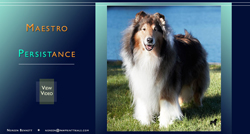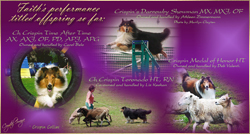|
An Interview with COL
4. Which is more challenging: the mental aspects of a given event in which you participate or the physical aspects. Talk about these challenges for trainer, handler and dog for the activities in which you take part.
Judy Belluomini: I have always found any of the activities to be mentally challenging. I have also enjoyed very sound Collies, so the physical has not been an issue. The Collie is wonderfully bright, but there are situations that can be complex. There are wonderful experienced Collie trainers in our area and they share some of the same complexities. The Collie is unique and that is what keeps us pursuing!
Marilyn Clayton: Mental - especially herding. There is so much to keep track of – the stock, the draw, the dog, environmental impacts, the course (especially in Canada where it's always different) and, of course, giving the correct command at the instant it's required to be effective – that's once you've figured out what needs to happen in order to get the stock where you want them!
The dog has to be confident enough to work on its own; biddable enough to take direction from the handler; trusting enough of the handler's ability to take those commands instantly; and have instinct to herd rather than chase. The dog has to be aware of what the handler is asking, often taking commands that don't make instinctual sense to him; he has to be constantly aware of the sheep's "bubble" which is constantly changing in reaction to the environment; he has to learn to regulate his power so he can move the stock easily but without sending them flying; he has to have the confidence to face challenging stock; and he has to have the physical ability to turn on a dime at full speed, so must be structurally correct and well-conditioned. Each set of stock is different and what they are willing to accept from a dog depends upon what they experienced in their last run, as well as, how calmly the present dog is working them. It's an absolute juggling act for our dogs.
For the new trainer/handler, there are new commands to learn. Especially challenging is remembering the correct flank in time to make the command effective. You need to learn to recognize the draws and read your stock – to determine who the lead critter is – and every set of stock is different and influenced by environmental factors. Also, most people have to travel significant distances in order to get stock time and/or suitable instruction. Herding is definitely challenging!
 Noreen Bennett: I think most sports are a combination of mental and physical. To me, the mental part of agility is the analysis of a course, looking at different angles like a geometry problem, figuring out where the judge has created challenges. The physical challenge is also intriguing because if the handler can run to every obstacle, they are more likely to have a better run than someone that cannot run to every obstacle and must rely purely on handling. If the timing is off for a handling cue, the dog will miss an obstacle or knock a bar. If you can run to every obstacle, those issues are taken out of the equation. The third part is the emotional aspect. Like with any sport, the desire for a title or qualifying score, can just completely ruin our best intentions. I've often said we all bring many things in the ring with us -- our dog, our sneakers, our leash, our nerves, our ego, bad knees, elder care issues, employement troubles, etc. It can get very crowded in the ring and that will affect our performance. Noreen Bennett: I think most sports are a combination of mental and physical. To me, the mental part of agility is the analysis of a course, looking at different angles like a geometry problem, figuring out where the judge has created challenges. The physical challenge is also intriguing because if the handler can run to every obstacle, they are more likely to have a better run than someone that cannot run to every obstacle and must rely purely on handling. If the timing is off for a handling cue, the dog will miss an obstacle or knock a bar. If you can run to every obstacle, those issues are taken out of the equation. The third part is the emotional aspect. Like with any sport, the desire for a title or qualifying score, can just completely ruin our best intentions. I've often said we all bring many things in the ring with us -- our dog, our sneakers, our leash, our nerves, our ego, bad knees, elder care issues, employement troubles, etc. It can get very crowded in the ring and that will affect our performance.
Jolene McCuaig: Both. In obedience it's the mental frame of mind for the dog to work under the stress of the environment. In agility it's physical for the dog and handler -- you have to remember a course and always be a step ahead of the dog. At times we are competing in extreme heat which is hard on both the handler and the dog.
Carol Lariviere: It's both for me. I'm not young, fit and I don't have long legs so I can't indicate each obstacle to the dog by running to it. I have to do this by being a better trainer. I have to make sure my dog holds his start line so I can get a couple of obstacles ahead. I have to make sure he sends out to obstacles so I can take the shorter, inner path. In herding, it's both too. I have a lot to learn about herding so we're a novice dog and a novice handler. Things happen quickly in herding and what you and the dog see one minute, can change in five seconds, requiring you to act quickly. I haven't learned enough yet to act that fast.
 Barbara Corriveau: The physical aspects of agility were very hard for me for several years due to worsening hip arthritis, so I would have to say the physical aspects have been more difficult for me for that reason. That caused me to take a long break from the sport as I just couldn't run any more. I have since had a hip replacement, but have not gotten back into the sport yet. Barbara Corriveau: The physical aspects of agility were very hard for me for several years due to worsening hip arthritis, so I would have to say the physical aspects have been more difficult for me for that reason. That caused me to take a long break from the sport as I just couldn't run any more. I have since had a hip replacement, but have not gotten back into the sport yet.
Michelle Shoemaker: I must say that for me the mental aspect of competing is more difficult than the physical aspects.
Erin Gorney: Hands down, the mental aspect. In each venue, there are the challenges of teaching a new skill, making sure that your dog stays happy and engaged, working through problem areas and beating back those trial nerves.
> Next Page
|